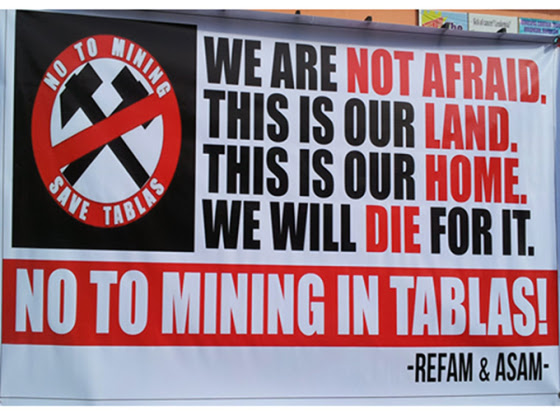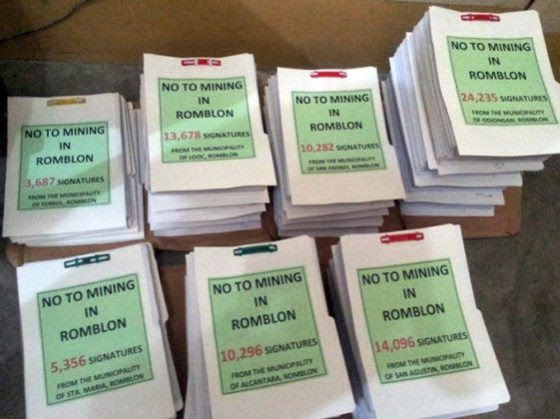Source: Papua New Guinea Mine Watch

Opposition to seabed mining in the archipelagic Philippine province of Romblon ... led by local anti-groups such as REFAM ... Image: Rachel Llorca/UST
Rachel E. Llorca | Asia Pacific Report | June 7, 2017
Fishermen from the archipelagic province of Romblon in the Philippines are opposed to planned' experimental' sea mining ventures in the area amid fears it will destroy their livelihoods.
One of these fishermen is 55-year-old Agosto Rivera. Fishing is his livelihood, with the fish nets and blue sea of Odiongan Bay –- part of Tablas Island –- his constant companion for 43 years.
With a PHP300 (NZD$8) daily bounty from fishing, and sometimes a PHP5000 (NZD$140) commission when doing deep sea fishing, the sea has been the lifeblood of Rivera’s wife and 10 children.
But Rivera’s livelihood, and that of the estimated 1390 fisher folk in Odiongan Bay, is said to be in danger. Rivera’s fears are echoed by local government leaders and cause-oriented citizens (known locally as Romblomanons) who are wary of prospective deep sea mining operations that the firm Asian Palladium Mineral Resources, Inc. wants to conduct in Romblon’s Tablas Strait.
The lure is palladium, a rare, malleable and ductile metal that can be used as petroleum or as a material for specialized alloys or pieces of jewelry. “Very few countries have deposits of palladium,” the company’s geologist, Louie Santos, told the Philippine Daily Inquirer in June 2016.
To get to Tablas Strait’s palladium, however, Asian Palladium must conduct deep sea mining across a 10.6ha area. This comes after Asian Palladium secured a 25-year Financial and/or Technical Assistance Agreement (FTTA) from the Mines and Geosciences Bureau of the Philippines’ Department of Environment and Natural Resources (DENR).
But as Asian Palladium is waiting for the Mines and Geosciences Bureau’s approval to its FTTA application, Romblomanons continue to reject the company’s plans for deep sea mining in the area, which began more than a year ago.
No mining allowed
Romblomanons’ opposition came towards the end of the term of former Philippine President Benigno Simeon Aquino III in May 2016 when Asian Palladium applied for the FTTA. Upon the assumption of Rodrigo Duterte as president on June 30, 2016, then environment secretary Regina Paz Lopez promised the local government of Odiongan that no mining, including that of Asian Palladium, “will be allowed.”
Lopez ordered the closure and suspension of identified mining companies across the country after assessment teams reportedly found hazards in these firms mining operations. But the Philippine legislature’s Commission on Appointments bypassed Lopez’s appointment thrice, and she was replaced by former Armed Forces of the Philippines (AFP) Chief of Staff Roy Cimatu.
It is such moves which have invigorated local anti-mining groups, such as the Romblon Ecumenical Forum Against Mining (REFAM), as closed or suspended companies remain poised for a reversal of Lopez’s orders.
“We will not let up in our advocacy,” says REFAM’s Sherryll Fetalvero.
Fetalvero, who is also a professor with Romblon State University, says the group has been “guarding” the province from mining projects.
“The strength of Romblon is the vigilance of the people.”
Some 127,853 signatures –- three-fourths of the province’s voting population –- have been collected from residents of Romblon province during anti-mining signature campaigns in the past. REFAM has also pushed for 125 anti-mining resolutions by local government officials, in the face of no province-wide environment act.

Mining opposition in Romblon is strong … 127,853 signatures. Image: Rachel Llorca/UST
Long-standing opposition
Current protest in Romblon is not the first time the province has opposed mining operations.
Eight years ago, Altai Philippines Mining Corporation was given a cease-and-desist order by the Mines and Geosciences Bureau for its planned metallic mining operations in Romblon’s Sibuyan Island, said to be rich in gold. This came after rising levels of atmospheric mercury were discovered by residents on the island.
In 2011, residents also protested against Ivanhoe Philippines, Inc., which applied for government permission to explore minerals in Tablas Island. Residents’ protest against Ivanhoe spanned nine months from January to September and was regarded as the shortest anti-mining campaign in the Philippines by civil society groups. Ivanhoe subsequently withdrew its exploration permit application on September 30, 2011.
Long-standing opposition in Romblon is not the first anti-mining advocates have asserted doubts on the safety of deep sea mining.
Deep sea mining in Papua New Guinea from 2011 to 2014 by Canadian firm Nautilus Minerals was halted following large protest by Papuans led by advocacy groups Bismarck Ramu and the Ocean Foundation’s deep sea mining campaign. The company subsequently removed its ships as its former seabed mining project – Solwara 1 – was referred to as an “experiment” by critics.
As to the mining firms trying to seek permission and operate in Romblon, however, Fetalvero says REFAM has a “tried-and-tested formula” to beat the firms as anti-mining messages continue to be promoted across the province.
“We stop mining companies by making sure they will not be able to get a certificate of publication from the towns of Romblon. That way, we will be able to question the technicalities of an approval by the DENR.”
- ACTNOW's blog
- Log in to post comments
